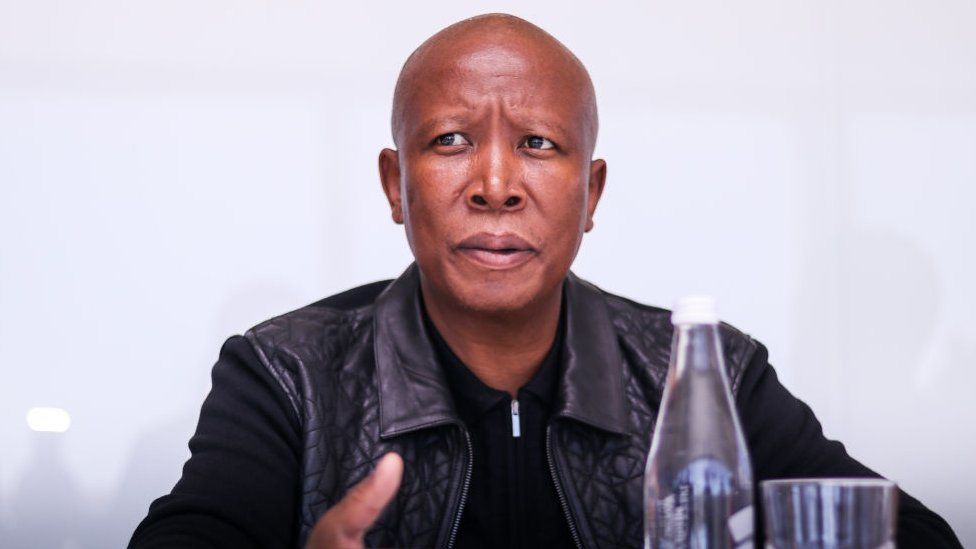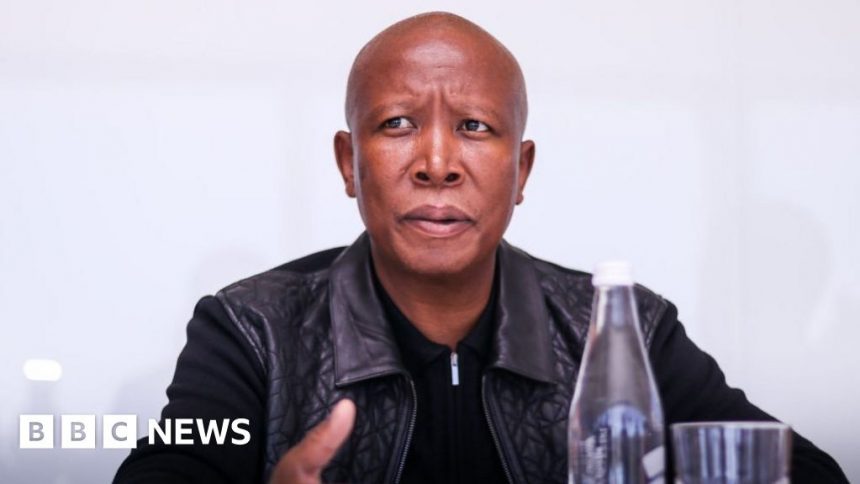Julius Malema – South Africa’s radical agenda-setter leading the EFF into 2024 elections
-
Published

Julius Malema has a reputation for defying boundaries.
His speeches at otherwise run-of-the-mill parliament sittings light up social media, the party he built from scratch almost 11 years ago has flourished to become South Africa’s third largest party and his reach extends not just across the nation but to elsewhere on the continent as well.
His vitality, paired with a radical ideology, have inspired many disenchanted South Africans. But the 43-year-old leader of the Economic Freedom Fighters (EFF) has many critics, who accuse him of opportunism and point out that he has been convicted twice for using hate speech.
He has split opinion, but also managed to sculpt his party into a disciplined force that has set the agenda in some policy areas.
Expelled from the governing African National Congress (ANC) in 2012, Mr Malema, or “Juju” as he is sometimes called, has positioned the EFF as the true inheritor of the ANC’s radical agenda and has exposed the governing party’s left flank.
The relentless focus by the EFF’s commander-in-chief on the inequality in South Africa, and the failure of the ANC to redistribute land from the white minority to the black majority, has cost support for his former party, which led the fight against apartheid.
In the 2019 general election, the EFF won nearly 11% of the vote and 44 seats in parliament. Pollsters Ipsos suggest the party may perform similarly this year.
Meanwhile, a number of polls predict the ANC could get less than 50% of the vote for the first time in 30 years and lose its majority in parliament.
Despite currently belonging to a minority party, Mr Malema and his colleagues are arguably the most visible politicians in parliament. They dress in red boiler suits – meant to symbolise solidarity with South Africa’s labourers – and their style of politics has led to fist fights and walkouts in the National Assembly.
Mr Malema himself is known for generating controversy – throughout his political career he has offended a wide range of people, from women’s rights groups, to white farmers, to his own political bosses.
He has twice been found guilty of using hate speech – in 2010 and 2011 – first for comments he made about the woman that accused former President Jacob Zuma of rape and then for singing the song “Shoot the Boer (Afrikaner)”.
The EFF chief sparked a row just last year, when he told crowds at a protest against Israel over the war in Gaza: “The EFF, when it takes over next year, is going to arm Hamas and make sure Hamas has the necessary equipment to fight for their people.”
Palestinian group Hamas, or in some cases its armed wing alone, is considered a terrorist group by Israel, the US, the EU, the UK and other entities.
And in 2016, when talking to supporters about the slow pace of land distribution, Mr Malema warned: “The land will be taken by any means necessary.
“We are not calling for the slaughtering of white people. At least for now. What we are calling for is the peaceful occupation of land and we don’t owe anyone an apology for that.”
Mr Malema’s supporters enjoy the combative rhetoric, and he remains an inspirational orator whose sharp focus on the rights of poor black South Africans has earned him their love.
He is especially popular among the youth – a demographic coveted by politicians who are keenly aware that South Africa’s median age is 28. Mr Malema has also generated a buzz when touring other African countries, such as Ghana, Liberia and Kenya.
Prof PLO Lumumba, chair of the Pan-African Institute that hosted Mr Malema in Kenya, told the BBC last year: “Malema represents a younger generation of Africans who are now beginning to articulate Pan-African issues in a manner that appeals to critical masses.”
However, in his home country Mr Malema is unlikely to win many votes outside his “loyal, but small” following, says political analyst Richard Calland.
“I think that the brand of Malema, which is destabilisation, anti-establishment… militant politics, even violent politics at times – I just don’t think it lands with the broader public.”
Mr Malema was born in 1981 and raised by his domestic worker mother Flora. He grew up in Seshego, a township in the northern Limpopo province.
His leaked final-year school results showed that the future firebrand barely scraped through with a below average pass. It’s a far cry from the man who has earned two university degrees while leading the EFF to political prominence.
Mr Malema says he joined the ANC’s young pioneer movement at the age of nine, where he was trained in armed resistance, and it took him just five years to become the regional head of the ANC Youth League.
But it was his election as ANC Youth League leader in 2008 that turned him into a key player in national politics.
His earliest actions as leader were to noisily campaign for Mr Zuma to take over – first as ANC leader and later as president – telling a crowd of supporters that he would “kill for Zuma”.
But Mr Malema’s relationship with Mr Zuma soured soon after the latter became president in 2009. Mr Malema accused his former ally of ignoring the poor voters who had propelled him to power. After being expelled from the ANC, he formed the EFF in 2013.
The idea that the ANC has distanced itself from its support base and core values has remained his theme.
In the introduction to the EFF’s 2024 manifesto, Mr Malema said the ANC had “reproduced and worsened apartheid economic inequalities”.
The manifesto promised to create jobs for the millions who are unemployed, end South Africa’s rolling power cuts and nationalise key parts of the economy, like mines and banks.
However, Mr Malema has in the past been accused of betraying the leftist ideology he promotes.
In 2013, South Africa’s revenue authority said the party leader owed more than $1m (£865,000) in unpaid taxes.
In order to pay the tax arrears, Mr Malema had to sell an unfinished mansion in Johannesburg’s upmarket Sandton suburb, which included a cinema room and a cigar lounge.
He also faced fraud and corruption charges related to a government contract. After three years, the charges were thrown out of court in 2015 because of lengthy delays in bringing him to trial, a judge ruled.
He always denied the charges and said they were politically motivated.
In 2018, Mr Malema was among a group accused of looting about 2bn rand ($108m; £86m) from a bank named VBS. Mr Malema rubbished the allegations and a parliamentary probe into the matter closed without a conclusion as investigators said they did not have “sufficient information”.
Mr Malema’s appeal remains virtually untouched despite the controversies of the last decade, but this year fresh challenges have arisen.
“Malema is going into the elections firmly in charge of the party, but not as firmly in charge as he was,” says Paddy Harper, a journalist with South Africa’s Mail & Guardian newspaper.
He points to reported tensions between Mr Malema and his deputy, Floyd Shivambu, as well as the EFF’s poor performance in recent by-elections.
The EFF also faces competition from uMkhonto we Sizwe (MK), a party founded just last year and headed by former President Jacob Zuma. According to Ipsos, MK has hoovered up some EFF supporters, particularly in Mr Zuma’s home province of KwaZulu-Nata.
Whether these roadblocks will hamper Mr Malema, the serial defier of odds, remains to be seen.
What we do know is that the radical leader has launched a drive to wrest the country from the ANC’s grasp with the trademark vigour that has landed him a legion of devoted fans.
Back in February, thousands of supporters in red party regalia erupted into a frenzy when Mr Malema arrived at the EFF’s manifesto launch.
Brandishing a copy of the document, he declared to the admiring crowd: “This is the weapon that will be used against the enemy of our revolution!”





